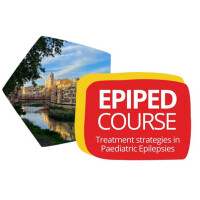HOMEPAGE
EPIPED COURSE 2026
Date : APRIL 22-25, 2026
Location : Girona (Spain)
Date : APRIL 22-25, 2026
Location : Girona (Spain)

EPIPED 2026
Treatment Strategies in Paediatric Epilepsies
TO DISCOVER THE FULL 2026 EPIPED COURSE PROGRAM:
CLICK HERE
Treatment Strategies in Paediatric Epilepsies
TO DISCOVER THE FULL 2026 EPIPED COURSE PROGRAM:
CLICK HERE
TREATMENT STRATEGIES IN PEDIATRIC EPILEPSIES (EPIPED):
3rd year of a 3 year-cycle (2024-2026) of the international interactive training course
One of the main missions of the European Reference Network ERN EpiCARE (https://epi-care.eu), in close collaboration with the International League Against Epilepsy and the Paediatric Neurology Societies, is training and education. Complex epilepsies, particularly of childhood-onset, and associated comorbidities, are those requiring multidisciplinary management through clearly identified care pathways. Rare epilepsies with unknown etiology require a specific clinical and consequent early diagnostic screening utilizing a multidisciplinary approach.
The correct and timely diagnosis of rare forms of epilepsy is crucial for a tailored, successful treatment.
During the last decade, the development of several new antiseizure medications (ASMs) and pre-surgical evaluation approaches have offered the chance for better care to an increasing number of children and adolescents with epilepsy. As an unavoidable result, best treatment choices become more and more complex, requiring a high level of expertise.
The aim of the third 3-year cycle EPIPED-Treatment (2024-2026) is to reduce the geographical and knowledge gap by providing neurologists and child neurologists involved in epilepsy care the opportunity for a regular update on best treatment practices. The concept of EPIPED is based on a 3-year cycle of independent annual training courses, developed specifically for child neurologists, physicians and epilepsy nurses caring for patients with epilepsy.
A limited number of plenary interactive sessions cover different aspects of treatment strategies in children with all types of epilepsies, particularly the rare and complex ones. Topics treated are related to pharmacology, pharmacodynamics, pharmacokinetics, genetics, analysis of ASMs trials, design of clinical trials, pre-surgical evaluation, optimal choice of ASMs, review of existing guidelines (ILAE, NICE, other), data on ketogenic diet, neurostimulation, indications for resective and palliative surgery, pharmacological treatments other than with ASMs, update on the development of targeted therapies. This link gives you access to the full program of the 3 years cycle : CLICK HERE
An important number of interactive modules allow participants, limited to 15 per group, to discuss with experts regarding the best clinical practices and therapeutic strategies. Participants, limited to 40-45, are offered the opportunity to also bring their own clinical cases for discussion of optimal treatment approaches.
This educational activity is addressing the corresponding learning objectives of the ILAE curriculum (Blümcke et al 2019) .
Seventy neurologists and neuro-pediatricians from several countries attended all or part of the first 3-year cycle, held in Girona, Spain (2017-2019). The second cycle (2021-2023) brought together a total of 142 participants over the 3 years, representing 40 participants per course. Girona proved to be an excellent hosting city facilitating interaction and networking. At the end of the daily sessions, participants have time to enjoy the city and discover some of the varied local gastronomic proposals.
The organization of EPIPED is also designed to facilitate networking, because we are convinced that it is only through collaborative working and sharing that an increased number of individuals with treatment-refractory epilepsy will have the cause of their epilepsy appropriately diagnosed and treated.
The success of the first two cycles (2017-2019 and 2021-2023) and the numerous requests from those that already participated, easily convinced us to renew the experience and to organize a third 3-year cycle (2024-2026) of intensive training and interaction.
We take this opportunity to thank all our educational partners over the years.
Alexis Arzimanoglou, Jaume Campistol, Masa Malenica
Course Directors
ALONSO Itziar (Spain), APARICIO Javier (Spain), ARMANGUE SALVADOR Thaís (Spain) ARONICA Eleonora (The Netherlands), ARZIMANOGLOU Alexis (Spain), AUVIN Stephane (France), BLÜMCKE Ingmar (Germany), BRAUN Kees (The Netherlands), BRUNKLAUS Andreas (UK), CAMPISTOL Jaume (Spain), CARRENO Mar (Spain), CROSS Helen (UK), Di GIORGIS Valentina (Italy), DOMINGUEZ Jana (Spain), DORFMÜLLER Georg (France), FONS Carmen (Spain), GARDELA Elena (Denmark), HOLTHAUSEN Hans (Germany), JANSEN Floor (The Netherlands), KALIAKATSOS Marios (UK), LAGAE Lieven (Belgium), LANDMARK Cecilie (Norway), LESCA Gaetan (France), LLANOS Loreto (Chile), MALENICA Masa (Croatia), MOLLER Rikke (Denmark), MURCHART Jordi (Spain), NABBOUT Rima (France), NOU Laia (Spain), ORTIGOZA Dario (Spain), OSTROWSKY-COSTE Karine (France), PANAGIOTAKAKI Eleni (France), PAPADOPOULOU Marietta (France), PEREZ Angeles Maria (Spain), PRESSLER Ronit (UK), RAMANTANI Georgia (Switzerland), RAMIREZ Alia (Spain), ROCAMORA Rodrigo (Spain), RUMIA Jordi (Spain), SAN ANTONIO Victoria (Germany), SANS Oscar (Spain), SPECCHIO Nicola (Italy), STRIANO Pasquale (Italy), SURGES Rainer (Germany), TASSI Laura (Italy), TRINKA Eugen (Austria), VALERA Carlos (Spain), VIGEVANO Federicao (Italy)
This event is endorsed by EPNS and ILAE

EPIPED COURSE - As years go by
CONTACT
The EPIPED 3 years’ cycle course, on TREATMENT STRATEGIES in PEDIATRIC EPILEPSIES, is organised under the auspices of the Departments of Neurology and Epileptology of the University Hospitals San Juan de Dios (Barcelona, Spain), Sestre Milosrdnice UHC (Zagreb, Croatia) and HCL (Lyon, France). It is endorsed by the European Reference Network for Rare and Complex Epilepsies, ERN EpiCARE and, the Executive Board of ILAE-Europe.

COURSE SECRETARIAT- ANT CONGRES
Epiped-course@ant-congres.com +33 (0) 4 67 10 92 23

Member access


